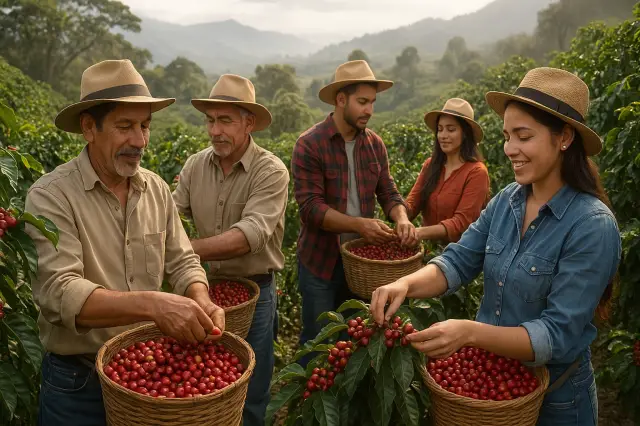By 2026, Colombian artisanal coffee is poised to become one of the country's most iconic products and a driving force for cultural, economic, and tourism innovation. Unlike industrial coffee, artisanal coffee focuses on quality, origin, sustainable processes, and the story behind each bean. This trend is not only winning over local palates but also positioning Colombia as a global leader in specialty coffees.
In recent years, coffee growers have focused on micro-farms, traditional methods, and sensory experiences that appeal to both tourists and discerning consumers. Thus, artisanal coffee is becoming a way to preserve the country's coffee heritage while adapting to the demands of the 21st century.
You can explore more cultural content on our blog CalendarioDeColombia.com .
The new generation of Colombian coffee growers
In 2026, a new generation of young coffee farmers is transforming rural Colombia. They are entrepreneurs who combine inherited wisdom with knowledge of agroecology, fair trade, and digital marketing. Many have returned to the countryside after studying in cities, motivated by sustainability and pride in their land.
Among the departments leading this trend are Huila, Nariño, Quindío and Tolima, regions where artisanal coffee is grown using organic practices, under natural shade and with respect for biodiversity.
Differences between industrial and artisanal coffee
To understand why artisanal coffee is gaining so much ground, it's worth reviewing its main differences compared to industrial coffee:
| Aspect | Industrial Coffee | Artisanal Coffee |
|---|---|---|
| Production | Large-scale, mechanized | On small family farms |
| Prosecution | Mixtures of unknown origin | Complete grain traceability |
| Taste and aroma | Uniform and standard | Complex, with unique notes depending on the region |
| Environmental approach | Use of chemicals and monoculture | Sustainable and responsible production |
| Consumer relations | Mass marketing | Personalized experience |
Single-origin coffees that will set trends in 2026
The rise of artisanal Colombian coffee is reflected in the recognition of farms and cooperatives that promote the authenticity of each region. Some notable examples for 2026 are:
Inzá Coffee (Cauca): recognized for its bright acidity and floral notes.
Coffee from Planadas (Tolima): medium body with notes of cocoa and nut.
Coffee from Pitalito (Huila): fruity and balanced flavor, highly appreciated in international competitions.
Coffee from the Coffee Region: traditional, with sweet aromas and light hints of caramel.
These coffees stand out not only for their flavor, but also for their social impact. Each cup represents the work of families committed to quality and fair trade.
Coffee tourism and immersive experiences
Coffee tourism is also experiencing a renaissance in 2026. Farms in Quindío, Risaralda, and Caldas have developed experiences that go beyond a simple tasting. Now, visitors can participate in the entire process: from harvesting the beans to the final cupping.
This type of sustainable tourism not only generates income but also educates visitors about the importance of conserving coffee-growing ecosystems. On the blog CalendarioDeColombia.com you can discover other Colombian tourist destinations ideal for this type of experience.
Innovation and sustainability in artisanal coffee farming
In 2026, innovation meets tradition. Producers are using clean technologies, such as solar drying, and reusing coffee byproducts to create organic fertilizers or natural cosmetics.
Likewise, the rise of artisanal Colombian coffee is linked to sustainability certifications, which guarantee ethical and environmentally friendly practices. Increasingly, consumers are seeking coffees with labels such as Rainforest Alliance or Fair Trade, which ensure that the product respects both the planet and rural communities.
How to enjoy artisanal coffee at home
For those who want to experience the full range of Colombian artisanal coffee, here are some practical tips:
Always buy single-origin coffee with producer information.
He prefers freshly roasted, not ground, beans.
Use manual methods such as French press, Chemex or V60 to preserve the aromas.
Adjust the grind and temperature according to your personal taste.
Accompany it with local foods: arepas, almojábanas or cassava bread.
Each preparation is an opportunity to appreciate the work behind each grain.
The future of Colombian artisanal coffee
The outlook for artisanal coffee in Colombia is promising. Exports of specialty coffees are expected to grow by 2026, along with a strengthening of domestic consumption. Furthermore, Colombian baristas are excelling in international competitions, enhancing the country's reputation as a producer of exceptional coffees.
Artisanal coffee represents not only a beverage, but a philosophy of life based on respect for the land, traditions, and the people who make each harvest possible.
If you're interested in learning more about Colombian traditions that strengthen our identity, we invite you to visit CalendarioDeColombia.com/blog , where you'll find articles about culture, historical events, and sustainable tourism.
